- Home
- Franz Kafka
Amerika
Amerika Read online
AMERIKA (THE MAN WHO DISAPPEARED)
FRANZ KAFKA was born of Jewish parents in Prague in 1883. The family spoke both Czech and German; Franz was sent to German-language schools and to the German University, from which he received his doctorate in law in 1906. He then worked for most of his life as a respected official of a state insurance company (first under the Austro-Hungarian Empire, then under the new Republic of Czechoslovakia). Literature, of which he said that he ‘consisted’, had to be pursued on the side. His emotional life was dominated by his relationships with his father, a man of overbearing character, and with a series of women: Felice Bauer from Berlin, to whom he was twice engaged; his Czech translator, Milena Jesenská-Pollak, to whom he became attached in 1920; and Dora Diamant, a young Jewish woman from Poland in whom he found a devoted companion during the last year of his life. Meanwhile, his writing had taken a new turn in 1917 with the outbreak of the tubercular illness from which he was to die in 1924. Only a small number of Kafka’s stories were published during his lifetime, and these are published in Penguin as Metamorphosis and Other Stories. He asked his friend, Max Brod, to see that all the writings he left should be destroyed. Brod felt unable to comply and undertook their publication instead, beginning with the three unfinished novels, The Trial (1925), The Castle (1926) and Amerika (1927). Other shorter works appeared posthumously in a more sporadic fashion.
MICHAEL HOFMANN was born in Freiburg in 1957 and came to England at the age of four. He went to schools in Edinburgh and Winchester, and studied English at Cambridge. He lives in London and Hamburg, and teaches part-time in the English Department of the University of Florida in Gainesville. He is the author of several books of poems and a book of criticism, Behind the Lines, and the translator of many modern and contemporary authors, including Joseph Roth, Wolfgang Koeppen, Durs Grünein and Thomas Bernhard. Penguin publish his translation of Kafka’s Metamorphosis and Other Stories and Ernst Jünger’s World War I memoir, Storm of Steel. He edited the anthology Twentieth-Century German Poetry, published in 2006.
Amerika
The Man Who Disappeared
Translated with an Introduction by
MICHAEL HOFMANN
PENGUIN BOOKS
PENGUIN BOOKS
Published by the Penguin Group
Penguin Books Ltd, 80 Strand, London WC2R 0RL, England
Penguin Group (USA) Inc., 375 Hudson Street, New York, New York 10014, USA
Penguin Group (Canada), 90 Eglinton Avenue East, Suite 700, Toronto, Ontario, Canada M4P 2Y3
(a division of Pearson Penguin Canada Inc.)
Penguin Ireland, 25 St Stephen’s Green, Dublin 2, Ireland (a division of Penguin Books Ltd)
Penguin Group (Australia), 250 Camberwell Road, Camberwell,
Victoria 3124, Australia (a division of Pearson Australia Group Pty Ltd)
Penguin Books India Pvt Ltd, 11 Community Centre,
Panchsheel Park, New Delhi – 110 017, India
Penguin Group (NZ), 67 Apollo Drive, Mairangi Bay, Auckland 1310, New Zealand
(a division of Pearson New Zealand Ltd)
Penguin Books (South Africa) (Pty) Ltd, 24 Sturdee Avenue, Rosebank, Johannesburg 2196, South Africa
Penguin Books Ltd, Registered Offices: 80 Strand, London WC2R 0RL, England
www.penguin.com
This translation and Introduction first published as The Man who Disappeared (Amerika) 1996
Published in Penguin Books under the current title 2007
2
Translation and Introduction copyright © Michael Hofmann, 1996
All rights reserved
The moral right of the translator has been asserted
Except in the United States of America, this book is sold subject
to the condition that it shall not, by way of trade or otherwise, be lent,
re-sold, hired out, or otherwise circulated without the publisher’s
prior consent in any form of binding or cover other than that in
which it is published and without a similar condition including this
condition being imposed on the subsequent purchaser
EISBN : 978–0–141–91131–1
CONTENTS
Introduction
Bibliography
Amerika (The Man Who Disappeared)
INTRODUCTION
Der Verschollene (The Man Who Disappeared), is the Cinderella among Kafka’s three novels: the earliest begun and earliest abandoned; the last to achieve posthumous publication (as Amerika), edited by Max Brod, in 1927; the least read, the least written about and the least ‘Kafka’. That said, I agree with Edwin Muir, whose English translation first came out in 1928, that it is ‘the most purely delightful of Kafka’s books’, and there is a weightier case to be made for it as well – not that delight should be lost sight of in the search for meaning.
It seems that Kafka worked on a version (which is now lost) of Der Verschollene from 1911 into the summer of 1912. It went slowly, and he was never happy with it. Then, following the writing of Das Urteil (The Judgement) in a single night (22–3 September 1912), he embarked on a second version, which went swimmingly. Brod reports on his friend’s progress:
I quote from my diary notes of the time. 29 September: ‘Kafka in ecstasy, writing all night. A novel set in America.’ 1 October: ‘Kafka in incredible ecstasy.’ 2 October: ‘Kafka, continuing very inspired. A chapter finished. I am happy for him.’ 3 October: ‘Kafka doing well.’ On the 6 October he read me The Judgement and The Stoker.
By 17 November he had completed six chapters and thought he could finish the novel by Christmas, when he had a week off. In the event, things happened differently. For three weeks, he was distracted by Metamorphosis, experienced increasing difficulties with the novel, and finally put it aside on 24 January 1913. In June, the first chapter, The Stoker, was published as ‘a fragment’ by Kurt Wolff, and there was some talk of putting it out in another volume, along with The Judgement and Metamorphosis, to be called perhaps Die Söhne (The Sons) – a suggestion of how Kafka expected to be read. When his copy of The Stoker arrived, Kafka read it aloud to his parents and noted:
Exuberance, because I liked The Stoker so much. In the evening I read it to my parents, there is no better critic than myself, reading aloud to my most reluctantly listening father. Many shallows, in amongst obviously inaccessible depths.
Kafka didn’t take up the manuscript again until October 1914, when he completed the ‘“Up, up!” cried Robinson’ section (from ‘This was most unfair’), and worked on the two final fragments before finally giving up, this time for good. Some of his subsequent judgements were spectacularly harsh – as with all his work – but he never actually destroyed The Man Who Disappeared, and the time came when he thought his revulsion came from incapacity, and it turned on himself: ‘strength apparently (already) beyond me today.’ In 1920, reading Milena Jesenská’s translation of The Stoker into Czech, he approved of her rendition of ‘in his exuberance, and because he was a strong lad’, while suggesting she should leave it out altogether, so little sympathy did he have left for his strikingly young, forthright, cheerful and brave hero. Not only did Kafka expect his writing to reflect himself (and to be better than himself), but to go on doing so.
The version that Brod published in 1927 differs from the present one in at least one matter of substance, and many of detail – if there is such a thing as a detail with Kafka. The substance is the section ‘“Up! Up,” cried Robinson’ and the first of the fragments, ‘Brunelda’s Departure’, never previously presented in English. The details range from the title of the book – which, though he may have spoken to Brod about his ‘American novel’, is only twice referred to in writing, both times as Der Verschollene (it is a book about a person, not a place) – to the
through-numbering and titles of the later chapters, including ‘The Nature Theatre of Oklahoma’, which were supplied by Brod. In the text, there are some thousands of differences – most of them merely corrections of such things as spelling and punctuation – from the age of the hero given in the first sentence (‘seventeen’ instead of ‘sixteen’) to the very last – Brod originally ended the book ‘Such a carefree journey in America they had never known,’ a falsely and quite preposterously un-Kafkaesquely ringing summary, instead of where Kafka actually broke off, ‘so close that the chill breath of them made their faces shudder’, characteristically menacing, peculiar, physical, ambivalent, something visual becoming palpable, words growing teeth, and an odd resemblance too to Yeats’s poem of disenchantment, ‘Towards Break of Day’:
Nothing that we love over-much
Is ponderable to our touch.
I dreamed towards break of day,
The cold blown spray in my nostril.
It may seem an odd thing to do, to go back to a rough, unedited and error-strewn manuscript version of a book: to reintroduce inconsistencies of spelling in the names of Mack and Renell (not to mention Lobter), to situate San Francisco in the East instead of the West, to have a bridge linking New York with Boston instead of Brooklyn, to talk of ‘quarter pounds’ instead of ‘quarter dollars’, to provide floor numbers that don’t add up and so forth, but for the translator, himself putting out a rough new text, it is pleasing to have a rough old one. Theatre people in particular will understand the importance of freshness of language. Muir’s version of Brod has had years to weather and settle; I like to think there is compatibility, if not parity, between the speed and unevenness of Kafka and what I’ve done. Anyway, this is only a partial exercise. I haven’t written ‘Newyork’ or ‘Occidental’ in minuscule letters, there is no way of usefully suggesting ‘Austriacisms’ in English, and so forth. (Nor, incidentally, have I fallen for the obvious temptation – not available to Muir or Kafka – of trying to make my translation sound ‘American’: that would have been to strive for a misleading verisimilitude. I may have meant ‘elevator’, but I enjoyed writing ‘lift’.) Brod’s work is often unarguable and always well-intentioned – and but for him we wouldn’t have had most of Kafka at all – but I am still glad to have been able to slip past it.
The prevailing sense of Amerika – Muir’s certainly – is that of a much sunnier book altogether than the other two, full of open space and forward movement and real people and things as against confinement, inertia and allegory. ‘The Nature Theatre of Oklahoma’, with its women on pedestals (where else!) blowing trumpets (what else!) promises to be Kafka’s vision of Heaven, and the happy ending he discussed with Brod has been widely reported:
In enigmatic language Kafka used to hint smilingly, that within this ‘almost limitless’ theatre his young hero was going to find again a profession, a standby, his freedom, even his old home and his parents, as if by some celestial witchery.
As if it were Kansas, not Oklahoma. Muir goes so far as to claim: ‘His story is the story of innocence, as that of the heroes of the other two books is the story of experience,’ but I think the opening sentence establishes Karl’s guilt beyond all doubt. He may feel and sound and act innocent, and think of himself as innocent, but when was that ever any defence in Kafka, in whom, here as elsewhere, guilt is assumed at the outset?
There is an opposing reading of The Man Who Disappeared, very effectively advanced in Hartmut Binder’s Kafka Kommentar, that, far from being a jolly picaresque or Chaplinade, its events actually describe a pitiless descent through American society, towards a probable catastrophe every bit as grim and ineluctable as those in The Trial or The Castle. The chapters are in triads: wandering, adoption and expulsion. The first six chapters that Kafka completed thus comprise two whole such cycles; and there is evidence – in Karl’s arrival at ‘Enterprise No. 25’, in the names ‘Fanny’ and ‘Negro’, in Karl’s reticence about his last place of employment and so forth – that in his novel Kafka was looking at a spiral of descent comprising four complete cycles: a young man with expectations, a lift-boy (what a symbol of forlorn aspirations!), a skivvy, and then, it has been conjectured, a fence and brothel-attendant While – especially in Kafka – the book’s plunging onward movement breeds hope, its cyclical organization guarantees doom. Binder points out that this book which – compared to his others – seems everywhere improvised (‘free improvisation without any or without much serious afterthought’, writes Muir), fanciful and airy, is actually extremely tightly and purposefully composed, full of careful echoes; that objects and relationships are not haphazard, but more like deformed replicas of one another. One thinks of the meals at Mr Pollunder’s house, outside the hotel, Robinson’s picnic on the balcony, and the welcome feast at Clayton (each one a last supper); the way the action takes place in what might be one room (one basic stage-set would certainly be enough), high up, balconied, over-furnished, with views (and no doubt Kafka would have brought the floor-numbers into conformity with one another!); the washings, Karl’s high-tech shower at his uncle’s, his wash in the Head Cook’s room, Brunelda’s medieval bath; such details as tickets, passports and visiting cards, music, drink and beards.
It seems likely – remember The Sons – that far from being free (‘the most worthless condition’ (p. 88), albeit) and in the land of the free (though quite how it deserves the label in the book is unclear), Karl is continually being made to replay his drama of expulsion, now with the Senator and the stoker as his ‘parents’, now with Mr Green and Mr Pollunder, now with the Head Cook and the Head Waiter, the implacable father and the mother who is, finally, no defence. There is a possibility that Kafka meant Karl to the at the end of the book – or perhaps already to be dead, with the Oklahoma Theatre a sort of afterlife – and if that sounds far-fetched, one should think about the fact that the lavish and pointless-seeming description of the box in the theatre that so fascinates Karl in Clayton is of the place where Lincoln – also described – was assassinated; that the Oklahoma Theatre was part-based on a large sanatorium called ‘Just’s Jungborn’ where Kafka spent the summer of 1912, that according to him gave its occupants some taste of America, and might not be heaven at all but a penal colony by other means, as Kafka loved to subvert expectation; that one of Kafka’s sourcebooks had a photograph labelled ‘Idyll in Oklahoma’ of a lynched black man surrounded by happy white faces (and Karl had just given his name as ‘Negro’). Binder suggests that Kafka was either telling the perennial optimist Brod what he wanted to hear, or maybe he was even winding him up. Perhaps the reconvening of the cast would be to witness a horrible judicial murder – as elsewhere in Kafka: why else would Liberty in the opening paragraph carry a sword? Where we leave the book – where the book leaves us – is with a mélange of Schlaraffenland (Cockaigne), bureaucracy in excelsis and – incredibly – Judentransporte.
This meaning, typically, seems about as far removed as possible from the experience of reading The Man Who Disappeared. ‘They are pictures, just pictures,’ Kafka remarked to Janouch. The French critic Claude David, quoted in Binder, writes:
Le roman de Kafka est comme construit sur deux plans. D’une part les aventures, une agitation incohérente…Mais, en dessous, règne un strict système de relations, un monde de signes, où rien n’est gratuit, où tout porte un sens, où tout invite à l’exégèse. (‘Kafka’s novel [The Man Who Dis appeared] has two levels. On the surface, there is the action, the story, an incoherent agitation… But buried underneath it, an ineluctable network of relationships exists, a world of signs where nothing is casual, where everything carries meaning and demands to be interpreted.’)
(Perhaps Kafka was referring to something like this when he wrote about shallows and inaccessible depths.) Nowhere in Kafka is this gulf greater than in The Man Who Disappeared, with its pantomime vividness and gusto. Although there is quite a bit of the fluid, bewildering and hilariously destabilizing description that one thinks of as Kafkaesque,
playing Zeno-like games with space and time and event, more striking is the number of sentences that do nothing but advance the action: ‘“What’s your name?” he asked, tucking his truncheon under his arm, and slowly pulling out a notepad.’ It’s an almost parodically meticulous transcription of an action, very nearly as modest as Kingsley Amis’s ideal novel sentence, ‘He put out his cigarette and left the room,’ except for its quotient of joy and its deliberate slowness. A lot of The Man Who Disappeared consists of direct speech – and Kafka’s characters like to talk, in Seamus Heaney’s line, ‘like a book of manners in the wilderness’ – interspersed with descriptions of gesture. Here, it doesn’t resemble epic (the novel) so much as drama, with speech and action (Kafka was going to the Yiddish theatre a lot in 1912). Almost more than action and gesture is the emphasis on blocking, grouping, distance, movement, positioning. It’s thus less like a playscript (one in which the dialogue, admittedly, is half-concealed in endless paragraphs – another thing Brod did was break up these prose blocks, exactly as a British editor would have done) than a director’s notes. Often the effect is absurd: the movements – and one’s awareness of them – are as artificial and elaborate as the speech itself, and quite often at variance with it: Karl ‘repeatedly pushing down a little pair of scales, for sheer delight’, Robinson and Delamarche ‘clinking glasses and keeping them touching in mid-air awhile’. In addition to its dramatic aspect, there is lyricism in the way the prose will sometimes strike an almost random note that reverberates powerfully in the reader’s mind. Cruelty, sex and homesickness are most often sounded, but there are also moments of dense, almost inexplicable peace:
In the empty lanes one occasionally saw a policeman on a horse, motionless, or the carriers of flags and banners spanning the whole street, or a workers’ leader surrounded by colleagues and shop stewards or an electric tramcar, which hadn’t managed to flee in time, and was now standing there dark and empty, with the driver and conductor sitting on the platform.

 Diaries of Franz Kafka
Diaries of Franz Kafka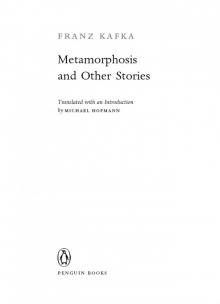 Metamorphosis and Other Stories
Metamorphosis and Other Stories The Castle: A New Translation Based on the Restored Text
The Castle: A New Translation Based on the Restored Text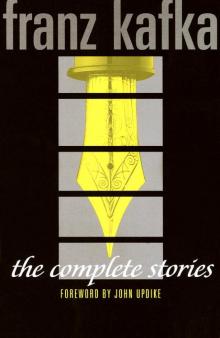 The Complete Stories
The Complete Stories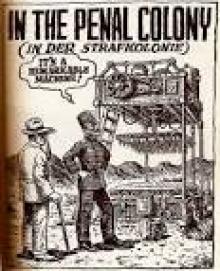 In the Penal Colony
In the Penal Colony The Trial
The Trial Amerika
Amerika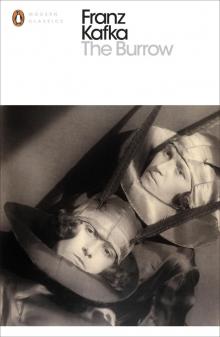 The Burrow: Posthumously Published Short Fiction
The Burrow: Posthumously Published Short Fiction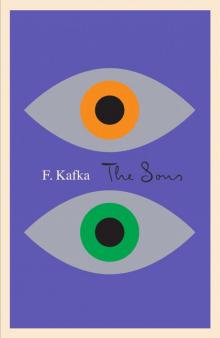 Sons
Sons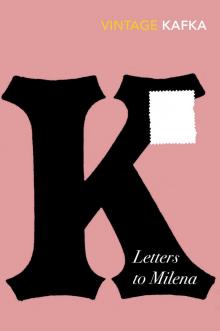 Letters to Milena
Letters to Milena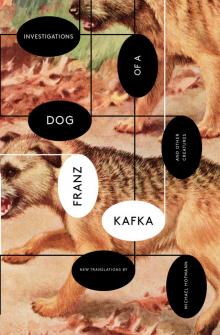 Investigations of a Dog: And Other Creatures
Investigations of a Dog: And Other Creatures Collected Stories
Collected Stories The Great Wall of China
The Great Wall of China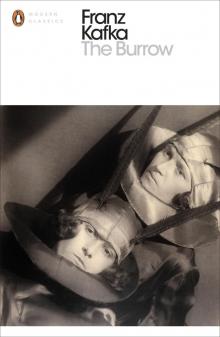 The Burrow
The Burrow The Castle
The Castle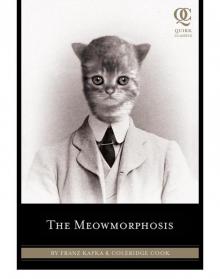 The Meowmorphosis
The Meowmorphosis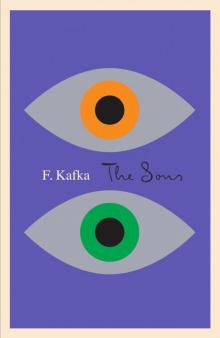 The Sons
The Sons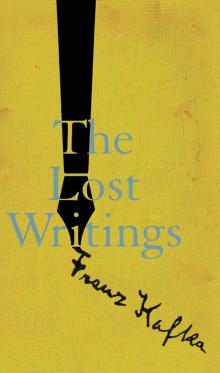 The Lost Writings
The Lost Writings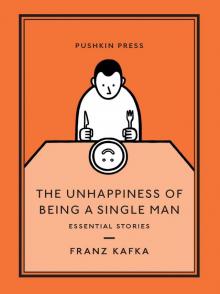 The Unhappiness of Being a Single Man
The Unhappiness of Being a Single Man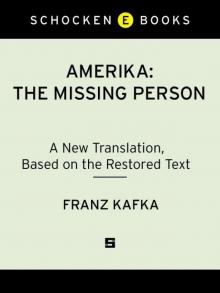 Amerika: The Missing Person: A New Translation, Based on the Restored Text
Amerika: The Missing Person: A New Translation, Based on the Restored Text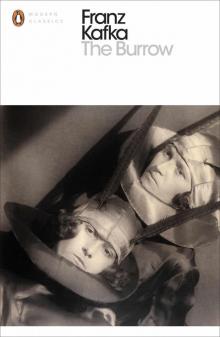 The Burrow: Posthumously Published Short Fiction (Penguin Modern Classics)
The Burrow: Posthumously Published Short Fiction (Penguin Modern Classics) The Diaries of Franz Kafka
The Diaries of Franz Kafka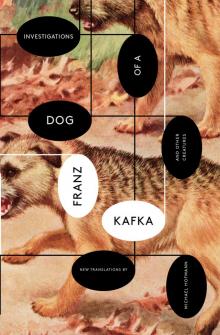 Investigations of a Dog
Investigations of a Dog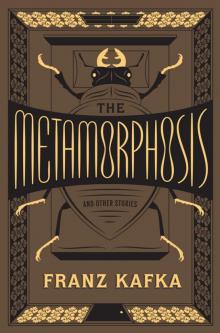 The Metamorphosis and Other Stories
The Metamorphosis and Other Stories The Trial: A New Translation Based on the Restored Text
The Trial: A New Translation Based on the Restored Text